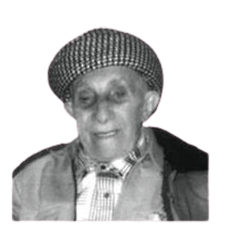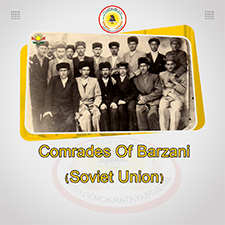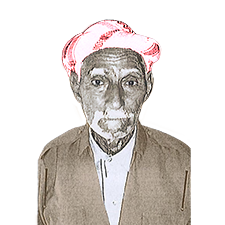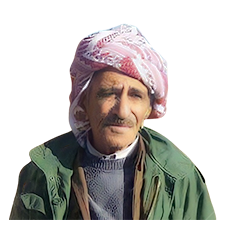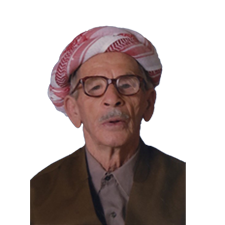Biography:
Pirmus Omer was born in 1916 in the village of Herur in Duhok. After going to the Soviet Union, due to his old age, he was not able to enroll in university, and he continued working. He was married twice in the Soviet Union. The first time was with Khajija, and they conceived a daughter by the name of Khalida. In 1959, When Pirmus came back to Kurdistan, Khajija did not come back with him, so for the second time, he married Sadiqa Nishan Mohammed who was from the Republic of Azerbaijan, and they conceived two daughter and a son by the name of Ramazan Pirmus who was born in 1955. After the fall of the Aylul revolution in 1975, he was transferred to Kani Mase by the Iraqi government. In 1977, he was transferred to the Talkabar community and then resided in Tasheesh for five years, and afterwards, he moved his home to Cham Sadida. When the Iraqi government attacked the villages, he moved his home to into a cave in Bari Nzari, and they lived there for two years. On 23rd March 1997, he passed away in Zakho.
In 1943, he contacted those that where a part of the second Barzani revolution, and he participated in the battles of Ble, Rezan and Barzan.On 6th November 1943, he participated in taking over the Goratu police station. On 19th August 1945, by the order of the military court of Iraq, they confiscated his transferred and non-transferred properties. On 5th September 1945, he participated in taking over the Maydan Moreeki police station. On 11th October 1945, after the fall of Barzan’s second revolution, he travels to eastern Kurdistan. After the creation of the Republic of Democratic Kurdistan in Mahabad, on 31st March 1946, as a soldier of Barzani military, he protected the republic.
Following the fall of the Kurdistan Democratic Party (KDP) in Mahabad and the return of Barzani from eastern Kurdistan to southern Kurdistan, Pirmus participated in the battles of “Naghada” and “Shno” in eastern Kurdistan. Also, he was one of those peshmergas on 19/4/1947 who went through the road of “Khwakurk u Dashti Baraz grawa” on the land of northern Kurdistan to return to “Sherwan” and “Mzuri”.
After their return, General Mustafa Barzani on 15/5/1947 in the village of “Argush” conducted a meeting with his comrades and granted them the freedom in whether to stay or go to the Soviet Union. In the meeting, everyone decides to leave and go to the Soviet Union. On the 23rd of May in 1947, Pirmus helps and travels with General Mustafa to the Soviet Union and fights in the battles of “Gali Qtur” and the Mako bridge. After a lot of hardships, on the 18th of June in 1947, Pirmus was able to travel to the Soviet Union after passing through the Aras River which was between the borders of Iran and the Soviet Union.
After their arrival to the Soviet Union on the 19th of June in 1947 in the city of “Nakhchawan” in the Republic of Azerbaijan, for forty days, all of the comrades were placed in a community that was surrounded by barbed wire. They were being monitored by the soldiers and were treated like hostages of war when it came to food and clothes. Afterwards, the Soviet government decided that the comrades should be divided into the places of “Aghdam”, “Lachin”, “Ayulax” and “Kalbajar” in the Republic of Azerbaijan. On the 10th of December in 1947, they were transported to a military camp on the lake of “Khazar” in the capital of the Republic of Mahabad “Bakor”. On the 23rd of the same month, they were given military clothes and were trained by the officers of the republic 8 hours a day. On top of that, some of the comrades that were literate in Kurdish would teach them the language for 4 hours a day.
After the ill-treatment of “Jaafar Baqrov” with the comrades, on the 29th of August in 1949, Barzani decides to transport his military camp from the republic of Mahabad to a “Chrchuk” community near the city of “Ashkand” which was the capital of Uzbekistan; there they continued their military practices.
In March 1949, the comrades were divided into the villages of the Soviet Union and farms (where civilians would rent them from the governments and pay them back later). The comrades were working in these places.
Following multiple letters to Stalin by General Barzani, a letter finally reaches Stalin where it talks about the hardships the comrades are going through. Stalin immediately creates a party to investigate the comrades of Barzani; the party comes to the decision that everyone should gather in the city of “Vrivsky”. Pirmus travels to the city in November of 1951.
After the revolution of the 14th of July in 1958 in Iraq and the return of General Mustafa Barzani on the 25th of February in 1959, Barzani and his comrades were granted full amnesty by the government.
Because of the creation of the Republic of Iraq in 1958 by Abdul Kareem Qasim, Pirmus along with his comrades travelled back to Kurdistan with the ship “Grozya” through the harbor of “Basra” on the 16th of April in 1959. He resided in Erbil, and after a few months, he went to Amedi and later on to Harur and Syaratukia.
In 1961, he participated in Aylul revolution. In 1988, when the Iraqi government started the Anfal campaign on the Badinan area, he migrates to the republic of Turkey as a refugee and resided in Arosh. Later on, he resided in Mush community in Mardin of Northern Kurdistan. In 1992 he comes back to southern Kurdistan. On 16th August 1996, in the Yobily Zerin celebration, due to his help and sacrifice in the second Barzani revolution, in the republic of democratic Kurdistan, aiding Barzani in going to the Soviet Union and the Aylul revolution, he was given the BArzani medal by president Mas’ood Barzani.
Sources:
- حامید گهوههری، میدالیای بارزانی بهرزترین خهڵاتی ڕێزلێنان، بهرگی یهكهم، (ههولێر - چاپخانهی حاجی هاشم - ٢٠١٥ز).
- حكومهتی ههرێمی كوردستان، وهزارهتی پلان دانان، یهكه كارگێڕییهكانی پارێزگاكانی ههرێمی كوردستان و ژمارهی خێزانهكان و دانیشتوان، ههولێر، ٢٠٠٩ز.
- حهمید گهردی، پوختهی مێژوونامه، چاپی یهكهم، (ههولێر - دهزگای چاپ و بڵاوكردنهوهی ئاراس - چاپخانهی وهزارهتی پهروهرده - ٢٠٠٤ز).
- حیدر فاروق السامرئي، ضیاء جعفر ودوره السیاسي و الاقتصادي في العراق، (لندن – دارالحكمة - ٢٠١٦م).
- ڕێكاری مزویری، ژنێن رۆس و ڕاگواستن و ئهنفال و كۆمهلكوژی، چاپی یهكهم، (ههولێر – چاپخانهی مناره - ٢٠١٠ز).
- شهعبان عهلی شهعبان، ههندێك زانیاری سیاسی و مێژوویی، چاپی سێیهم، (ههولێر - چاپخانهی رۆژههلات - ٢٠١٣ز).
- شهوكهت شێخ یهزدین، یۆبیلی زێڕینی پێشمهرگه، (پیرمام - چاپخانه خهبات - ١٩٩٦ز).
- قائید میرۆ میرۆزی، شهڕی گورهتوویێ ل ٦ تشرینی دووهمی١٩٤٣ دا، گۆڤاری دهنگی پێشمهرگه، ئۆرگانی مهكتهبی رێكخستنی پێشمهرگه، ژماره ٤٣، پیرمام، چاپخانهی رۆشنبیری، ٣١ تهمووزی ٢٠٠١.
- كاروان محهمهد مهجید، بارزانییهكان له مههابادهوه بۆ سۆڤێت، چاپی یهكهم، (سلێمانی - چاپخانهی پهیوهند - ٢٠١١ز).
- گۆڤاری ههتاو، ژماره ١٥٤، ساڵی شهشهم، ههولێر، چاپخانهی كوردستان، ههینی، ١٥ نیسانی ١٩٥٩.
- له چوارچێوهی ئاههنگهكانی یۆبیلی زێڕیندا، سهرۆك مهسعود بارزانی میدالیای بارزانی به تیكۆشهران و دایكانی شههید دهبهخشێت، گوڤاری گوڵان، ئۆرگانی پارتی دیموكراتی كوردستان، ژماره ٨٤، ههولێر، ١ ئهیلوولی ١٩٩٦ز.
- له یادداشتی فهرماندهی شههید حهسۆ میرخان ژاژۆكی، ٦٢ رۆژ لهگهڵ بارزانی دا چوونی بارزانییهكان بۆ یهكێتی سۆڤێت، چاپی یهكهم (ههولێر - چاپخانهی رۆشنبیری - ١٩٩٧ز).
- لیث عبدالمحسن جواد الزبیدي، ثورة ١٤ تموز ١٩٥٨ في العراق، (بغداد - دارالرشید للنشر - 1979م).
- مسعود بارزانی، بارزانی و بزوتنهوهی رزگاریخوازی كورد ١٩٣١-١٩٥٨، (دهۆك - چاپخانهی خهبات - ١٩٩٨ز).
- نهجهف قولی پسیان، له مهابادی خوێناوییهوه ههتا لێوارهكانی ئاراس، و. شهوكهت شێخ یهزدین، چاپی یهكهم، (پیرمام - یۆبیلی زێڕینی پارتی دیموكراتی كوردستان - ١٩٩٦ز).
- ئـ.د.ئـ، فایلی ژماره AI-10، لیستی ههڤاڵانی مستهفا بارزانی بۆ یهكێتی سۆڤێت، بهڵگهنامه لهلایهن سهگڤان هاڵۆ پێشكهش كراوه، ٢٠١٦ز.
- ئـ.د.ئـ، فایلی ژماره HB-407، پارتی دیموكراتی كوردستان، بارهگای بارزانی، لێژنهی باڵای ناوچهی بارزان، فۆرمی پیرموس عومهر خهلیل (پیرۆ یوسف)، پیرمام، ١ تشرینی دووهمی ٢٠١٨ز.




